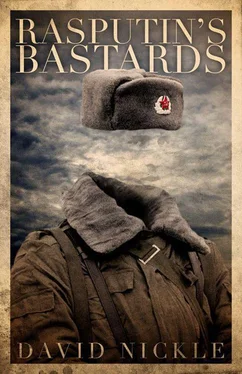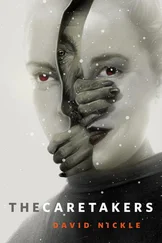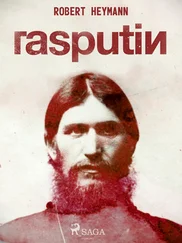Sure enough — the hatch swung open, and the stink of eons wafted out.
The old woman was in chains in the bottom of Filtration Room Three. She was like the rest down here — pallid, with wide dark eyes and a mouth that puckered back over too few teeth. She glared up at Mrs. Kontos-Wu from her prison between the two intake pipes. Mrs. Kontos-Wu rested her hands on opposite elbows, drumming her fingers, as she looked into those dark, empty eyes.
“Lois?” she said.
“That,” said the hag, “is one of my names. To you .”
Mrs. Kontos-Wu sighed. Why don’t you just spin your head around now ? she thought. But she said instead:
“Babushka, then?”
The hag didn’t answer — just held Mrs. Kontos-Wu’s gaze, trying to worm her way inside, until she had to look away. Mrs. Kontos-Wu walked back across the gantry to her two companions — Vanya and Mishka, who looked scarcely more human than the woman below.
The two were trembling — much as Vanya had been, when he’d first hailed Mrs. Kontos-Wu from across the algae pond. Help us , he’d said. He’d repeated that over and over again, even after Mrs. Kontos-Wu promised she’d try — if he’d only tell her what the trouble was.
“Minds are going,” he’d said. “One by one by one. You can save the minds — stop this, yes?”
Mrs. Kontos-Wu didn’t know. But she was looking for a distraction now — anything to keep her awake, and out of the metaphor that had so betrayed her.
“I’ll see what I can do,” she said.
Vanya took her hand in his own clammy paw and led her further into the depths of this station — yammering on the way. It developed that he was an old submariner who specialized in the nuclear plants. His family came from Belarus, near Minsk. He’d been transferred to Petroska Station after taking an aptitude test, one winter’s morning in 1978. Left behind a daughter and his young wife. Mrs. Kontos-Wu politely suggested that he might be missing them but he explained that no, he visited them every chance he got. “They have nice country house now — big A-frame. On lake. I go there every day. Make love to my wife.”
Mrs. Kontos-Wu looked into the creature’s dark eyes, set back in pale, hairless brows, and tried to convey credulity.
“But now,” he said as they climbed a narrow spiral staircase and pushed open a hatch to the machinery decks, “I soon will never go back. She take our minds.”
“ She ?”
“Oh yes.” he said, nodding quickly. “Then we good for nothing.”
He’d taken her up four floors, and into a room that might at one time have been a comfortable barracks room. Now, though, it resembled a ward room in a government-run retirement home. The walls were panelled in wood veneer punctured with thousands of thumb-tacks. It was lit by flickering fluorescent tubes set into the ceiling. It smelled like pee. There were maybe a dozen beds there — all of them occupied, with the same sort of bizarre, pale creatures. They stared vacantly like Alzheimer’s patients.
One other — who Mrs. Kontos-Wu later learned was Mishka — looked after these ones, shuffling about with bed pans and trays of food.
“She take our minds,” repeated Vanya. “We good for nothing.”
Mrs. Kontos-Wu frowned.
“Are these,” she guessed, “the Mystics?”
It was certainly possible that they might be. She could in fact imagine Fyodor Kolyokov like this, if he’d managed to a few more years in that isolation tank of his.
Vanya, however, seemed to think that idea was hysterically funny. He laughed and laughed. “Mystics? No, no. Not Mystics.”
“Not Mystics.”
He nodded. “Tools of the Mystics,” he said. “Tools.”
“Puppets.”
“Puppets. With—” he made a snipping motion with his fingers.
“The strings cut,” said Mrs. Kontos-Wu wryly. “Yes.”
He nodded. “You here to save us. Like the other one. The baby.”
“Like the baby?” Mrs. Kontos-Wu frowned.
“You,” he said. “Like the baby.”
“Vladimir? No. I’m not like Vladimir.”
The old man looked disappointed for a moment, then brightened. “We begged for new saviour. Boy came through — just ignored us. Went fooling around in the sea. But now — here you are. Saviour.”
“I’m no saviour,” said Mrs. Kontos-Wu.
“Perhaps,” he said, “you simply do not know it yet.”
Mrs. Kontos-Wu shook her head. “I think,” she said, “I’m just a puppet with its strings cut. Let’s leave it at that, shall we?”
Now, she was facing down a puppet with its strings very much intact. They had led her here — to a place where they’d tied the puppet up, after she’d become quite violent just a day ago. The creature would not talk with Mishka and Vanya — tell them what’s going on — but they told them to bring Mrs. Kontos-Wu there, and she’d talk to her.
Of course, when they met it was clear what the creature’s agenda was.
She called out to Mrs. Kontos-Wu now.
“Hey! Don’t you want to know how the book ends?”
Mrs. Kontos-Wu went back to the railing. She leaned on it.
“It’s not a real book,” she said.
“Oh,” said the hag. Lois. Babushka. “You know what is real, do you my child?”
“I’m not your child.” Mrs. Kontos-Wu stepped over to the stairs going down to the floor of the pumping station. “And I think I do know what is real. At least, I know the real that I choose.”
“Ha. Wise answer. Are you sure you want to come down here?”
Mrs. Kontos-Wu swung around and stepped onto an access ladder. “Why wouldn’t I?”
“Doesn’t it remind you of someplace?”
Mrs. Kontos-Wu stopped. “What place?”
“Why, that book,” said the hag. “The one that wasn’t real.”
Mrs. Kontos-Wu looked down at the woman. Her hair was black and frizzy — it trailed down her shoulders and ended in twisted, greasy knots.
“The Cistern of Blood, child.”
Mrs. Kontos-Wu looked around. Certainly there was a superficial resemblance — the pumping room was entered through a space high above its floor, and it took the form of a deep cylinder. Overhead, there was a grate that led to some other chamber. It wouldn’t take much to imagine the steel walls replaced with stone — and the light of an Istanbul marketplace filtering in through the grate above her. The hag continued. “You might find yourself rescuing Jim. Or,” she added, “doing as I said and returning to your berth — taking care of the bastard children there — and joining me.”
Mrs. Kontos-Wu stopped on the ladder. Above her, Vanya and Mishka watched expectantly.
“How are you doing?” called Vanya. “Almost got it?”
“Doing fine,” said Mrs. Kontos-Wu nonchalantly.
She climbed down the stairs.
“Heh heh. Good girl,” said the hag. “Now. Do as you are told. Go and kill the children and destroy the Mystics — and join me back at the school.”
Mrs. Kontos-Wu stepped over to the old woman who was possessed by Babushka — the woman who’d killed through her. She looked back up — thought briefly of climbing the ladder and heading back to the submarine, along a route that was suddenly clear to her.
But she looked back at the hag, leaned down in front of her.
“It’s been a long and sad life here, hasn’t it?” she said, and with one hand delicately pinched the clammy nostrils together — put her other hand over the old woman’s mouth.
When he’d been outside swimming in the brain of his giant squid, Stephen had treated himself to a tour of Petroska Station from the outside. It was an eccentric structure — a rambling thing that in some places resembled a giant bathyscaphe — others a medieval castle — and others a high-rise apartment building done on the cheap. How tall was it? If you counted some sections that scudded down the slope of the shelf, and the five little towers that poked out of its middle, you could probably put fourteen storeys on it. But those towers were narrow as needles, and you couldn’t say whether they were inhabitable. And some of the shapes that crawled down the slope could have housed nothing more than conduits. It was as though the place had been grown rather than built. Stephen had circled it for hours — tapping it with tentacles and sliding one of the squid’s immense eyes close to the bulkheads. But it was no good. He couldn’t make a useful map of the place.
Читать дальше












